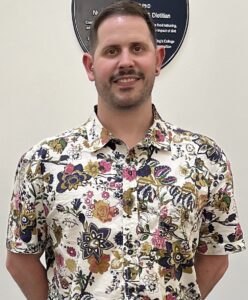
By EDI Committee Member, Dr Lewis Mattin
Dr Lewis Mattin is an early career Nutritional Physiologist based in the School of Life Sciences at the University of Westminster. He holds a BSc in Nutrition and an MRes in Sports Nutrition from Nottingham Trent University and completed his PhD in appetite regulation at Manchester Metropolitan University.
Dr Mattin’s research lies at the intersection of nutrition, physiology, and endocrinology, with a particular focus on the gut-brain axis and its role in appetite regulation. His work investigates how physical activity influences gastrointestinal function and appetite signalling, contributing to broader understanding in areas such as gastrointestinal resilience, metabolic regulation, weight management, and female physiology. Although grounded in exercise science, his research adopts a multidisciplinary approach with a strong endocrine focus.
In his academic role, Dr Mattin contributes significantly to both teaching and leadership. He leads a large Human Physiology “mega module”, physiological networks and serves as Co-Course Leader for the BSc Human Nutrition degree at the University of Westminster. He is also a representative on the physiological society EDI Committee, a member of the Society for Endocrinology Public Engagement Committee, and an Academic Associate on the Sport and Exercise Nutrition Register (SENr) and a Fellow of the Higher Education Academy, reflecting his dedication to both scientific inquiry and high-quality education.
As part of our Faces of Physiology Series, we spoke to Dr Lewis Mattin about how he’s carved his own path that matters and how we can support everyone to thrive.
Why is EDI important to you, and what motivated you to get involved?
I believe EDI is about challenging perceptions and focusing on solutions to enable and not disable all walks of life. However, I regularly challenge and raise real complex issues that others are sometimes unwilling to discuss sometimes, that are often difficult to talk about openly in an academic and professional setting. Identity, perception, and privilege show themselves in numerous ways, and it’s possible to acknowledge structural advantages while also recognising personal struggles. In academic spaces, intelligence and identity are rightly central topics, and people can sometimes make sweeping generalisations to justify their position. The key is providing balance in order for everybody to be seen, heard and understood, holding space for conversations while also harnessing the fact that pain and discomfort are not exclusive to one group. Therefore, I want to advocate and continue promoting equality and diversity in academic institutions and research settings to allow everyone to thrive. There is more than one direction or route to success and building new ideas and solving complex problems are achieved when people from all walks of life are given time to be seen and heard. Not fitting with the ‘norms’, should be celebrated. It is not until we leave our comfort zone that great things can happen.
What challenges have you overcome to get to where you are?
Being a white male in academia comes with a set of assumptions. Often, as I walk through the corridors, there’s an unspoken presumption that my path has been smooth and that I live a life shaped by privilege. I know this not just from glances, but from comments made directly by students over the years. Although the truth is, everyone carries unseen struggles. We all have chapters in our story that are not visible at first glance. While it’s important to talk about privilege and systemic inequality, it’s equally important to remember “we shouldn’t judge a book by its cover”. As a first-generation university student, starting my academic journey was both overwhelming and transformative. It wasn’t just a major learning experience for me, but one that my entire family also had to endure. Navigating expectation, environmental challenges and unfamiliar circumstances which went beyond the classroom and each step I took in academia was something that I shared whilst adapting and growing to my new challenges. This was made harder by the added burden of having multiple learning difficulties. I go about my day-to-day life having dyslexia, neurodiversity and Irlen syndrome. In several ways, most people who know me would suggest I am sometimes over-enthusiastic, can’t sit still, and usually talk too much, which has led to challenges in my academic journey. However, maybe this is also the energy that allows me to continue stretching boundaries every day.
Who is your biggest role model and why?
The concept of a role model is an interesting paradigm, particularly at a time when we urgently need academics, policymakers, and industry leaders to step forward and be counted. We face an unprecedented burden in the form of climate change, and unless we act now, the devastating consequences of what humanity has done to the planet will become irreversible. We should not be afraid to break bad habits or call people out to demand the changes needed to live healthier, more sustainable lives. One person who, for me, has consistently fought battles others are often unwilling to take on is Jamie Oliver. He began his food fight in 2005 when I was at the beginning of my nutrition adventure, when he pushed to get high-quality, nutritious food onto the plates of schoolchildren across the UK. Since then, he has challenged politicians and large corporations on issues like child obesity, the sugar tax, and free school meals, advocating for some of the most vulnerable and impressionable members of our society. Regardless of what people may think of him, Jamie Oliver continues to fight for causes he believes are true and just. In my lifetime, I can’t think of anyone else who has been as willing to raise their voice and take action in moments where silence would have been easier. His commitment hasn’t stopped with food. He’s continued to push for meaningful reform in education, particularly in how we support children with learning difficulties, so that every child, no matter their background or ability, has the opportunity to grow, learn, and thrive in an inclusive environment. For me is what a role model is.
What are you most proud of in your career so far?
Working in academia often means being surrounded by people who are content to be passengers, unwilling to step up or grow within a system that is under immense pressure, both internally and publicly. Finding any sort of balance between work and home life is incredibly difficult. I am so proud of my wife, Laura, who not only supports my ambitious career aspirations but also works full-time while being an incredible mother to our two very lively boys. Most people choose careers based on what they’re naturally good at. I chose a path where I often feel like I’m working with both hands tied behind my back and one eye covered by an eyepatch. My learning difficulties add pressure to my day-to-day work, and the brainpower it takes to read, write, and process information can be overwhelming at times, yet the satisfaction I feel when I publish another journal article, contribute to a book chapter, or deliver a keynote presentation is unmatched. These moments remind me that I have defied the odds. I didn’t take “no” for an answer. I carved a path not because it was easy, but because I knew it mattered.
These are the faces of physiology. Help us see the full picture — complete our EDI survey this autumn to help shape the future of an inclusive community.
We’re always looking to celebrate our members and their stories. If you would like to share your story with us, please contact membership@physoc.org.

